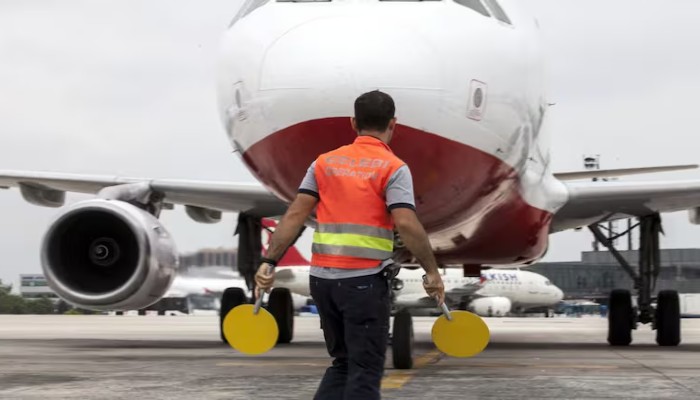Çelebi Shares Plunge After India Revokes Clearance Over Security Concerns

Çelebi Aviation shares fall nearly 20% after India withdraws security clearance
Çelebi Aviation shares fall nearly 20% after India withdraws security clearance, halting operations at major airports amid national security concerns.
The decision by India’s Bureau of Civil Aviation Security (BCAS) to immediately revoke the security clearance of Çelebi’s Indian subsidiaries has triggered a sharp decline in the Turkish company’s stock, with a 10% drop on Thursday followed by another 10% on Friday. Trading of Çelebi shares was suspended multiple times on the Borsa Istanbul due to the steep decline.
The BCAS action affects Çelebi Airport Services India Pvt Ltd and its associated entities, which provided ground handling services at major Indian airports including those in Delhi, Mumbai, Bengaluru, Chennai, and Hyderabad. The revocation order was issued “in the interest of national security”, Indian authorities said.
India’s Minister of Civil Aviation, Ram Mohan Naidu, confirmed the move, stating: “Nothing is above the security of our nation and our fellow citizens. National interest and public safety are paramount and non-negotiable.”
The government has instructed airports to ensure continued operations by working with alternative ground handling companies, such as AI Airport Services, Air India SATS, and Bird Group, while aiming to retain current employees affected by the transition.
Diplomatic Tensions with Turkey
The decision comes amid heightened diplomatic tensions between India and Turkey. Ankara has expressed vocal support for Pakistan in the wake of recent military clashes between India and Pakistan. These developments reportedly included the use of Turkish-made drones by Pakistan during Operation Sindoor, an Indian military initiative targeting terrorist camps across the border.
Although Çelebi Aviation Holding has publicly distanced itself from political matters, Indian authorities appear to have acted in response to growing public and political pressure. Murlidhar Mohol, India’s Minister of State for Civil Aviation, said the ministry had received requests from across the country to terminate Çelebi’s operations.
“Recognising the seriousness of the issue and the call to protect national interests, we have taken cognizance of these requests,” he stated on social media.
Çelebi Responds
In response, Çelebi Airport Services India strongly rejected any political affiliation or foreign ownership influence, calling itself “truly an Indian enterprise” led by Indian professionals.
“We are not a Turkish organisation by any standard and adhere fully to globally accepted practices of corporate governance, transparency, and neutrality,” the company said in a statement.
The firm denied rumours linking it to Sümeyye Erdoğan Bayraktar, daughter of Turkish President Recep Tayyip Erdoğan, stating that it is majority-owned by international institutional investors and has no political ties.
The company said it would pursue “all administrative and legal remedies” to contest the revocation.
Economic Impact on Çelebi
India represents a significant market for Çelebi Aviation. The company reported that its Indian operations contributed approximately 33.8%—or around $195 million—to its total consolidated revenue of $585 million in 2024. Çelebi has been operating in India since 2009, investing over $250 million and employing more than 10,000 people.
The sudden cessation of its Indian operations has raised concerns among investors, with Çelebi shares falling from a recent high of TRY 3,285 to TRY 2,002 by 16 May—a nearly 30% decline in four trading sessions.
Industry Adjustments Underway
Delhi International Airport Limited (DIAL) has confirmed it ended its partnership with Çelebi entities and is coordinating with other service providers to ensure uninterrupted ground handling operations. Ground handling includes essential airport services such as passenger check-in, baggage handling, aircraft servicing, and cargo management.
In an official statement, DIAL said: “Efforts are being made to ensure that employees working with Çelebi are retained and continue to contribute, and to ensure seamless handling of passengers and cargo at all affected airports.”
Context: The Role of Ground Handling in Aviation
Ground handling is a vital component of airport operations, supporting the smooth functioning of aircraft turnaround, passenger services, and logistics. The exit of a major player like Çelebi from the Indian aviation sector, particularly at high-traffic airports, poses significant operational challenges in the short term.
The incident also highlights the geopolitical dimensions of economic decision-making. India’s recent actions suggest a willingness to enforce economic consequences on foreign companies perceived to be linked, directly or indirectly, to countries critical of its national security operations.
While Çelebi maintains that its business is independent and apolitical, its experience may prompt other international firms operating in sensitive sectors to re-evaluate the geopolitical risks associated with operating in India.
Conclusion
As India navigates heightened regional tensions, particularly with Pakistan and its allies, companies with perceived ties to politically contentious states may face increased scrutiny. Çelebi’s ongoing efforts to contest the BCAS decision, and the Indian government’s management of service continuity at affected airports, will likely determine the long-term ramifications of this high-profile case.

India Revokes Celebi Aviation Security Clearance Amid Turkey-Pakistan Ties
India cancels security clearance of Turkish firm Celebi Aviation over national security concerns following Turkey’s support for Pakistan in Operation Sindoor.
|2025-05-16

India-US Trade Deal: Trump Claims ‘Zero Tariffs’ as Jaishankar Urges Caution
US President Donald Trump claims India offered zero tariffs on American goods. India responds, calling the remarks premature amid ongoing trade negotiations.
|2025-05-16

Adani Airport Ends Lounge Access Partnership With DragonPass One Week After Launch
Adani Airport Holdings has ended its partnership with China-based lounge provider DragonPass, halting access for DragonPass users at Adani-managed Indian airports.
|2025-05-16

IndusInd Bank Uncovers ₹674 Crore Interest Misstatement in Audit Review
IndusInd Bank's internal audit reveals ₹674 crore wrongly booked as interest income and ₹595 crore in unexplained assets, prompting internal controls review.
|2025-05-16

Microsoft Layoffs Spark Online Debate Over Job Security in Tech and Government Sectors
Microsoft layoffs reignite debate on private vs government job security, with Indian social media users weighing career stability against high tech salaries.
|2025-05-15




